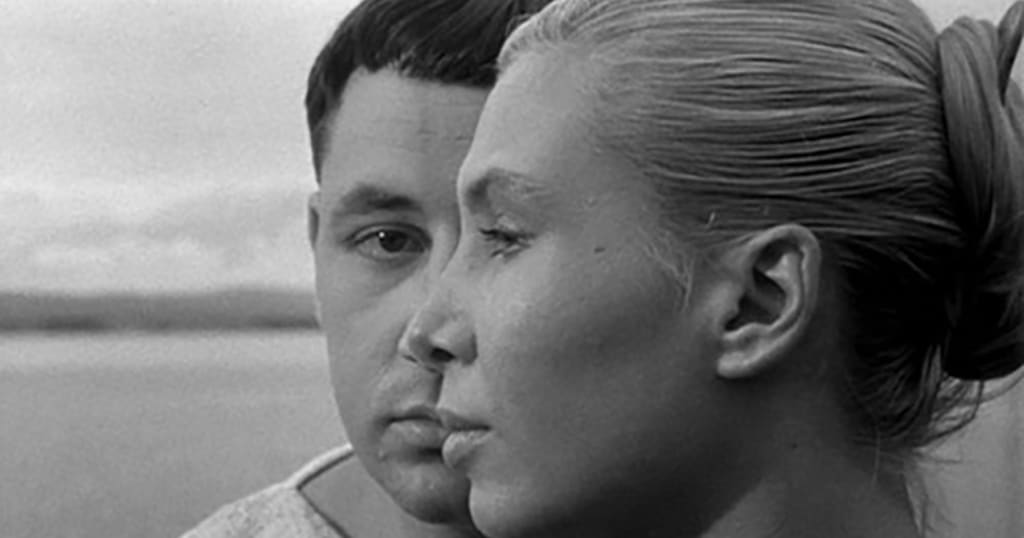Viewing Varda Part One: ‘La Pointe Courte’
The beginning of an iconic career!

When the news broke on March 29th, 2019 that Agnès Varda had passed away at age 90 from cancer, the film world mourned, but I did not. I recognized the name of course, but had I seen any of her films? As it turned out, actually yes. About 18 months prior, I had enjoyed an obscure documentary called Faces Places; I remembered it being very cute, and that the old woman’s hairstyle was quite strange. So that was that, and I moved on. It would be over a year until I, too, mourned the loss of one of the greatest, most important filmmakers to ever live.
Viewing Varda
Welcome to Viewing Varda, the article series where I go through the entirety of Agnès Varda’s filmography (shorts too) in chronological order. The goal of this series will be to review each individual film Varda directed, while also placing her works in the context of her life and her world, so that we might appreciate just how daring she really was as both a filmmaker and a woman.
Very few of the new generation seem to be aware of Varda’s influence. Film students have likely only seen Cléo from 5 to 7, and the layperson has likely seen nothing at all from her. However, it would be pointless to shame people for not having seen, much less intimately knowing, any given film; to quote William Bibbiani, a critic I owe a lot to, “we are all playing catch-up.” Learning that there is an area of film with which you are not familiar is a happy revelation, a wonderful opportunity to expand your cinematic horizons! So if you haven’t seen any of Varda’s films, don’t feel ashamed: you have such lovely treats ahead of you!
Some Background
Now, before we get into our first film, I believe it’d be valuable to begin with a little bit of context as to who Varda was and what French cinema was before her start, which was itself the beginning of the French New Wave.
Arlette Varda was born on May 30th, 1928 in Brussels. After living through World War II in Southern France, she changed her name to Agnès, went to university, and by 1950 had found a passion and a career in photography, which would go on to deeply influence her filmmaking. Meanwhile, French cinema had been through the wringer thanks to the war, but a strong studio system had been reestablished by the early 1950s, and plenty of good cinema was being made. However, in the eyes of some bold young film critics (Jean Luc-Godard, François Truffaut, you may have heard of them), this studio system was bland, and it was time for a new type of cinema to take hold.
Whether or not these critics were right, ironically, doesn’t really factor into our discussion of Varda. Because believe it or not, Varda never watched films! As a result, when she one day just up and decided to write a script and direct it completely independently, she had no one but herself and her friends to draw on. How did it turn out? Let’s discuss:
La Pointe Courte – Summary
La Pointe Courte (1954) is a narrative feature written and directed by Agnès Varda, and features an ensemble cast. The film centers a small fishing village in the South of France called La Pointe Courte, where fishermen simply try to get by while continually being accosted by government officials. Additionally, a couple, now four years into their marriage, have come to visit from Paris. The husband Lui, played by Philippe Noiret, grew up in the village; he wishes to show its beauty to his wife Elle, played by Silvia Monfort. However, when Elle finally does arrive, five days after Lui, she announces that she believes they should separate; discussion ensues (and ensues, and ensues).
First Impressions
The first time I viewed La Pointe Courte, I had very mixed feelings. Throughout the film, the focus keeps shifting back and forth between the villagers and the couple. The village, though its dramas are subtle, feels alive, and when the village feels something, you feel it too. In contrast to this, the couple felt practically statuesque; their emotions were non-existent, their monologues trite, their perpetual ennui more annoying than worthy of sympathy. Worst of all, they just. would not. shut up. Every time the film cut to the couple, I would roll my eyes and wait for it to cut back to the villagers.
...
READ THE REST OF THIS ARTICLE ON OUR WEBSITE: https://moviebabble.com/2020/10/04/viewing-varda-part-one-la-pointe-courte/
About the Creator
MovieBabble
The Casual Way to Discuss Movies! Head over to moviebabble.com to see all our content!






Comments
There are no comments for this story
Be the first to respond and start the conversation.